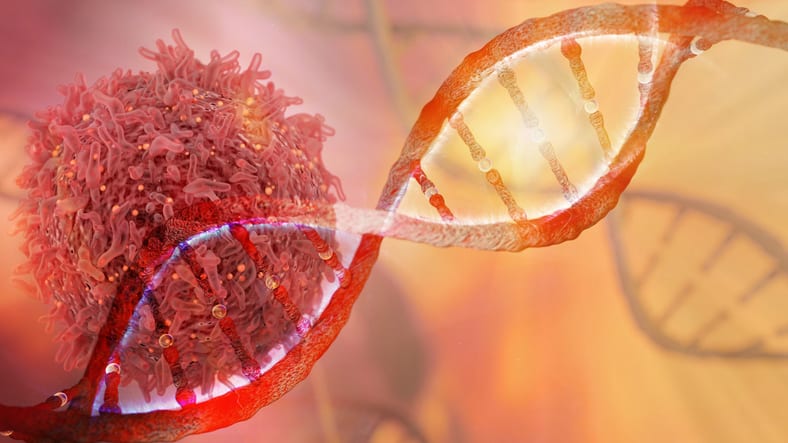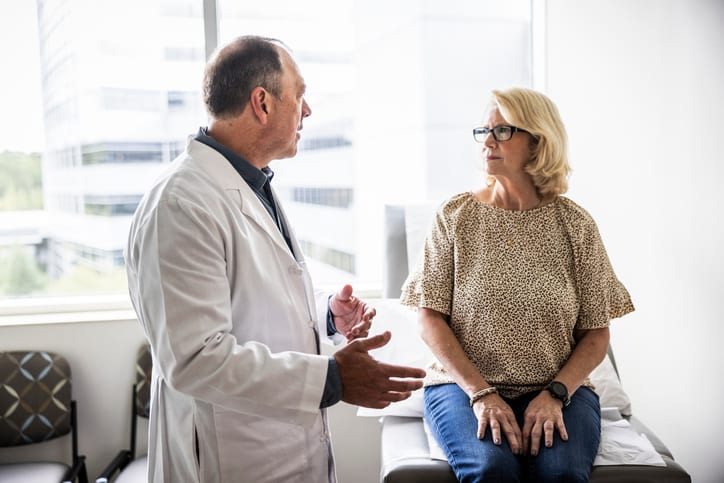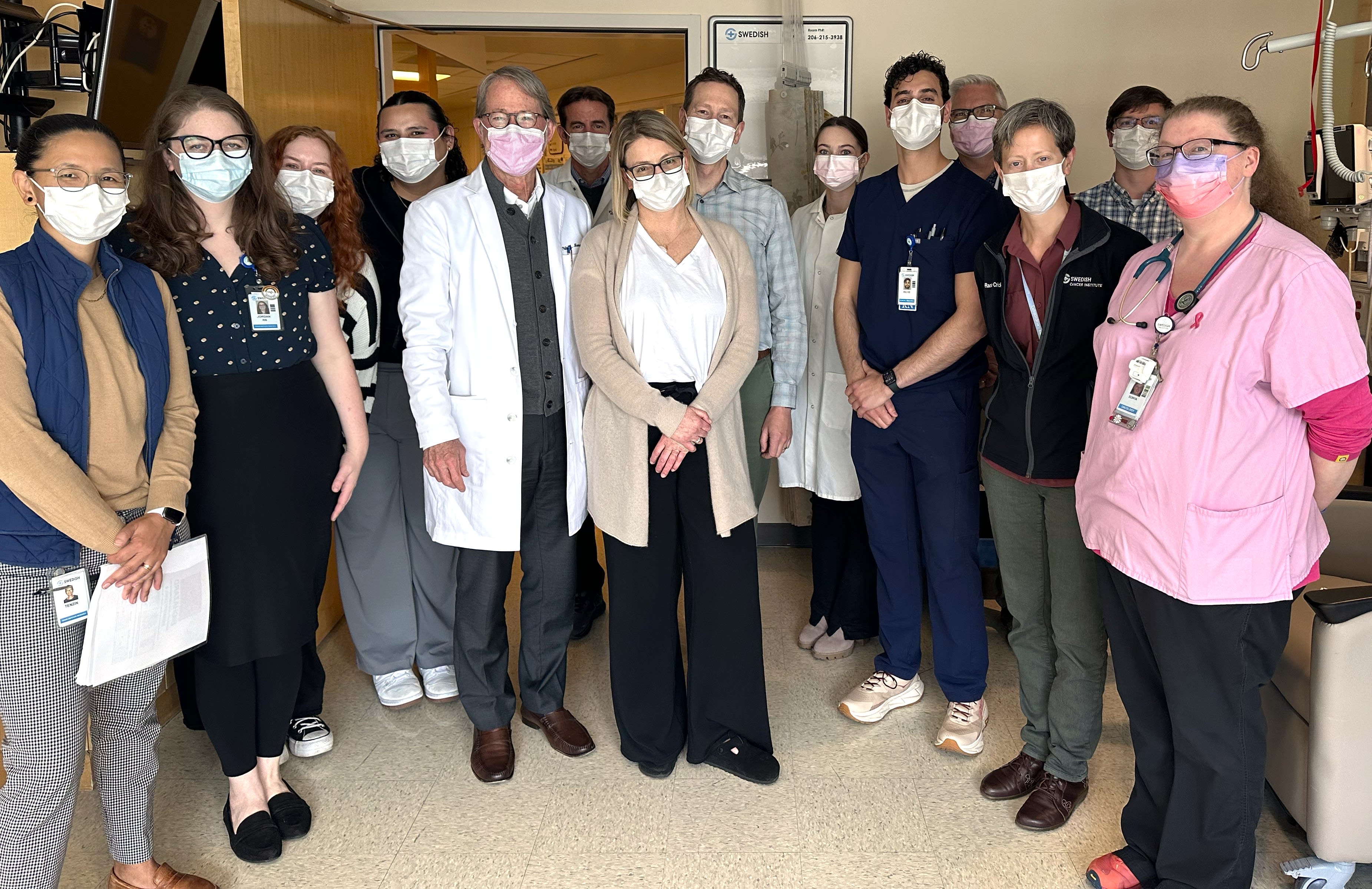Molecular Targeted Therapy
Disrupting Cancer Cell Growth
Molecular targeted therapy treats cancer at its source — by precisely targeting the specific molecules that help cancer cells grow. This focused approach may slow the cancer’s growth, reduce side effects, and improve quality of life. At the Providence Swedish Cancer Institute, we bring this same level of precision and personalization to every part of your care.

Treatment Overview
Molecular targeted therapy works by blocking the specific proteins or genetic changes that help cancer grow. Unlike chemotherapy or radiation, which affect both healthy and cancerous cells, targeted therapy is designed to focus just on the cancer — reducing side effects and helping protect healthy tissue.
Depending on your type of cancer, targeted therapy may be given as a pill or through an infusion. These treatments are tailored to your specific cancer, and your care team will keep a close eye on your progress. If something isn’t working as expected, we’ll adjust your plan for the best possible outcomes.
At the Providence Swedish Cancer Institute, we’re here to support you at every step — helping manage side effects, answering your questions, and making sure you feel confident and cared for throughout your treatment.
What to Expect
At the Providence Swedish Cancer Institute, we’ll guide you through the planning stages of molecular targeted therapy through recovery and future treatment if needed. Your care team is here to support your physical healing, emotional well-being, and personal goals, so you can move forward with confidence.
Before you start molecular targeted therapy, your oncologist will explain your treatment plan, including how the medication works and any potential side effects. You may need lab tests or imaging before starting treatment. Depending on the therapy, you may take medication at home or visit an infusion center. Bring your questions — we’re here to help you feel confident and ready for treatment.
After each treatment, your care team stays closely involved to make sure the therapy is working as expected.
If you’re taking medication at home, we’ll check in regularly to monitor side effects, track your response, and adjust your plan if needed. If you’re receiving infusions, we’ll review how you're feeling after each session and guide follow-up care.
Ongoing check-ins help us monitor your progress, manage any side effects, and ensure you continue feeling as well as possible throughout treatment.
Molecular targeted therapy focuses on the specific changes driving your cancer, which means it may work more effectively with fewer side effects than traditional treatments. By targeting only cancer cells — not healthy ones — it can help slow the cancer’s progression, improve outcomes, and support a better quality of life during treatment. In some cases, it can also be combined with other therapies for better overall outcomes.
While molecular targeted therapy is often more precise than traditional treatments, it can still cause side effects. These may include:
- Fatigue
- Skin rash or dryness
- Diarrhea
- High blood pressure
- Liver function changes
Side effects vary depending on the specific drug and how your body responds. Your care team will monitor you closely, manage symptoms, and adjust your treatment if needed.
Your care team is here to support you throughout and after your treatments. Regular checkups are important so we can continue to manage any of your ongoing treatment needs and watch for signs of recurrence. Services are also available to help you through every treatment stage.
Learn more about our supportive care services.
Frequently Asked Questions
Molecular targeted therapies work in different ways depending on the triggers causing your cancer to grow. They may block the signals cancer cells use to divide, stop tumors from forming new blood vessels, or help the immune system find and attack cancer cells. Some target specific mutations or proteins, like HER2 or EGFR. Depending on the drug, treatment may come as a daily pill or be given by infusion at a clinic.
Molecular targeted therapy is often part of a larger treatment plan. Your care team may also recommend surgery, radiation, chemotherapy, or biologic therapies, depending on your diagnosis and how the cancer responds. If additional treatment is needed, your doctors will explain why, walk you through what to expect, and work with you to create a plan that fits your needs and goals.
The length of time you need molecular targeted therapy varies based on your diagnosis and how your body responds to the treatment. Some patients may take medication for several months. Others may take it long-term as maintenance therapy. Your oncologist regularly assesses your progress to determine how long you need to continue treatment. The goal is to ensure the best possible outcome while managing any side effects.
Many patients can continue their daily activities while receiving molecular targeted therapy.
Whether you're taking pills at home or receiving infusions, your team helps you manage any side effects that may impact your routine. While you may need to make some adjustments, many people can work, exercise, and spend time with family during treatment. Your team will guide you on how to balance treatment with your lifestyle.
Recovery from molecular targeted therapy varies for each person. Side effects can include fatigue, skin changes, or digestive issues, but these are often manageable with your care team’s support.
Unlike other treatments like surgery or chemotherapy, recovery from molecular targeted therapy doesn’t involve a specific recovery period. Instead, it’s more about adjusting to the ongoing treatment and managing side effects. With regular check-ins and support services, we make sure you’re cared for throughout your recovery.
We provide a full range of supportive care services to support you during and after your cancer treatment. Some of these services include:
- Art therapists
- Cancer rehabilitation (onco-physiatry)
- Care coordinators
- Genetic counseling (cancer geneticist)
- Health educators
- Medical massage (edema, lymphedema management)
- Music therapist
- Naturopaths
- Nutritionists
- Oncology nurses
- Social workers
- Speech and language pathology
We can also help with finances, food, transportation, and other challenges for eligible patients through our patient assistance fund.
See the full list of supportive care services.
Note: Some services are provided by local partners and vary based on location. Please contact your clinic for more information.
Patients have access to hundreds of clinical trials involving most cancer types. We are often among the first in the U.S. to provide access to Phase 1 trials — the first stage of evaluating treatments in humans. Please note, we open new trials often. Check with your clinician for the latest in upcoming trials.
Learn more and find out if a clinical trial could become part of your treatment plan.
News & Info From Our Experts



